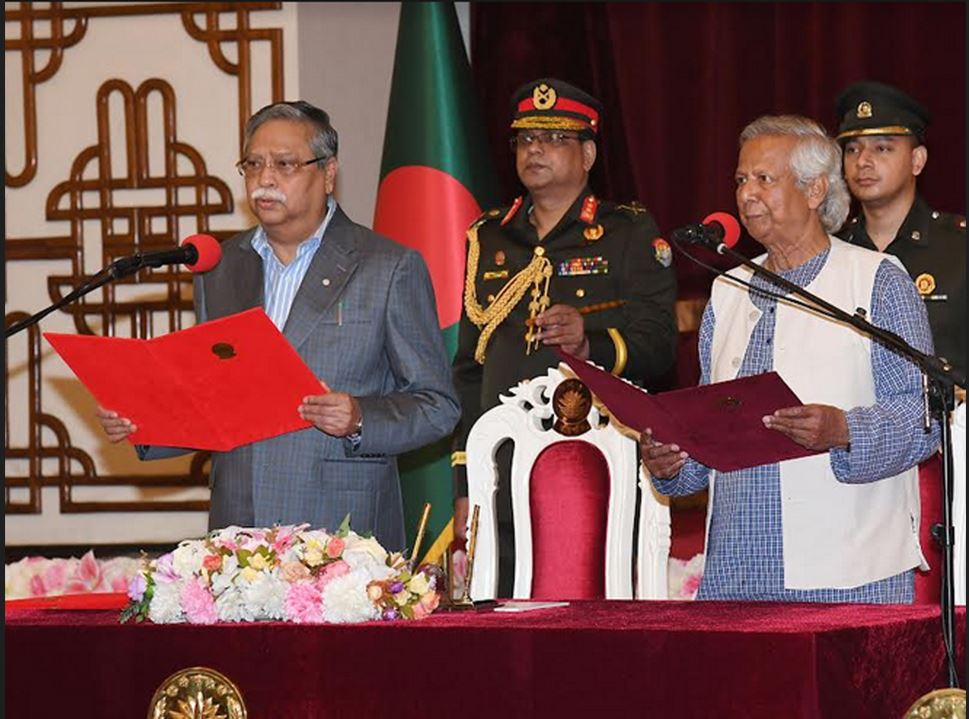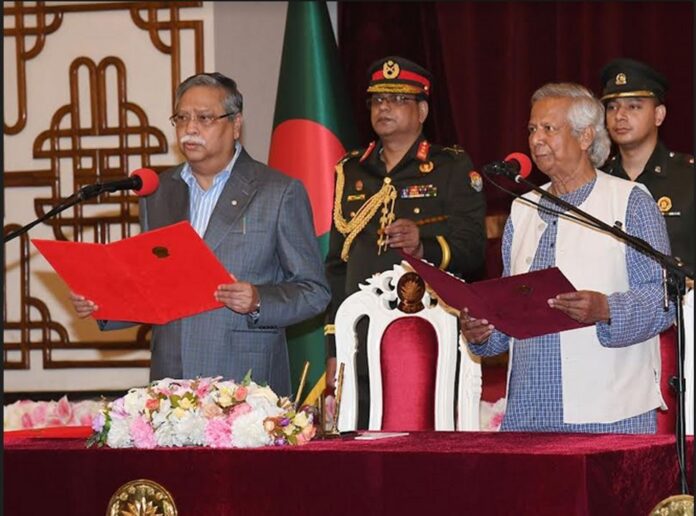
In his first speech as the as the Chief Adviser of the new Interim Government (IG) of Bangladesh, Dr. Muhammad Yunus warned that he and his colleagues were in the middle of repairing the nation-wide institutions already wrecked by the ousted Prime Minister Sheikh Hasina’s (Hasina) despotic regime over 15 years. His bids to restructure the troubled administration are amongst the thorniest endeavors for those who run the country now. Institutional reforms are usually complex on more than one count, and cautious steps are better than riding the flying balloons of unhinged aspirations! Reorganization of one institutional sector affects other swathes of governance, politics, and the larger society too. Such calls demand institutional insight as well as an appreciation of the discontents of those ventures.
Not long ago, Selim Raihan’s article in a local Bengali daily that hoisted a photo of a young lady writing a wall poster Chalo Rashtra Sanskar Kari (Let us do state reforms!) sharply attracted my attention. I grew up in the 1940s and 1950s—those were the days of posters and wall papers! That placard was indeed a voice from the grassroots! The student leaders who steered the anti-quota movement that eventually brought down the Hasina rule want a thorough restructuring of the political system. Recently, the British Weekly Economist broached an alarm that Dr. M. Yunus was racing against time! I cannot help feeling that the current interim government throbs between the populist demands and the snares of reshaping the country’s discredited institutions.
The UN Human Rights Office’s preliminary analysis of the latest civil unrest in Bangladesh (August 17, 2024) advised that the interim government’s priority was to “restore democratic order and rule of law through an inclusive and participatory process.” If the interim authority rewrites the entire constitution, it will open a can of prickly issues, which might stall its other imperatives. Governmental changes never get a smooth sail though they are so vital for Bangladesh now struggling out of deaths, destructions, law and order breakdown, staggering inflation, extraordinary flood, and the feared economic collapse.
Pakistan reached its constitution-making goal in 1956 after a notoriously tortuous path. When General Ayub Khan scrapped it in 1958, I remember a foreign journalist compared him with someone standing before a blank board and wondering what to write on it! I would not be surprised if the interim regime is now passing through such musing moments. General Ayub Khan imposed a tailor-made constitution in 1962, abandoned later in Pakistan.
There are integral triggers for which it is a dare to launch reforms without stepping on vested interests of one kind or the other. One of my political science professors used to say that a constitution was like the vest of a person, which should fit his/her size. It means that a constitution, indeed a set of fundamental rules and regulations, must serve people and adjust to their needs, hopes and aspirations. Yet a constitution must offer stability, which unfortunately, could suffer abuse by authoritarian leaders and other manipulative outbursts.
Firmness of identity and ideology give a sense of consensus and an agreement on the fundamentals of governance irrespective of religious, linguistic, racial, sex and language differences signify the hallmarks of a pluralistic democracy. Therefore, a constitution must go through an established and agreed amendment procedure. In the real world of politics, however, a constitution— metaphorically speaking, is like a goalpost which the political actors move at their respective conveniences! Having a constitution, as we have seen in Bangladesh and elsewhere, does not always guarantee a democracy. “Constitutional autocracies” and “Illiberal democracies” abound this world! The members of the interim cabinet are aware that Bangladesh fell under an unyielding autocracy while a written constitution and the prescribed legislative and judicial institutions were still in their respective tracts. The first constitution of Bangladesh did not go through adequate deliberation as Sheikh Mujibur Rahman’s populist charisma deterred the opposing arguments.
Can we distribute authority between the legislative and executive branches with the wisdom of separation of powers handed down by our ancestors? In dealing with the legislature, the constitution makers face the decline of the legislative functions in the traditional parliamentary form of government. Hasina used the national parliament as her rubber stamp! Now, Bangladesh has a real antipathy towards a heavy concentration of power in the hands of the prime minister. How will Dr. Yunus reconcile the growing sentiment against an overtly powerful prime minister and the global trend of more power for the chief executive?
Both the BNP and the Jamaat-e-Islami (Jamaat), two visibly active parties now, demand election, but, so far, they are willing to extend a reasonable amount of time to prepare the necessary ground for a fair election. In his introductory address to the nation, Dr. Yunus outlined two key points about his and his team’s tenure and the estimated election. He added that he assumed the current position at the invitation of the student leaders who toppled an autocratic rule, and he will, with his colleagues, quit whenever those trailblazers would ask them to leave. The timing of the national election would be a “political decision” after restoration of the administrative order, he suggested. Those messages are still hazy and uncertain to those parties and leaders who want to return to an elected authority. The BNP has already warned that it was not ready to concede an indefinite deferment for the next election. I fear a not-so-distant disagreement between the major political parties and the IG over the timing of the next election. Politicians are keenly watching the interceding cabinet while the thundering slogans of the student leaders have not yet faded from the headlines!
Bangladesh is a deserving case for proportional representation that brings diverse parties under alliances for power sharing, which, hopefully, create a systemic protection against the majoritarian invectives that the student-led revolt so angrily rejected with an appalling loss of lives and untold sufferings. Such electoral redrawing would daunt one party winning absolute majority in the legislature and establish a single party supremacy. By no means an easy job, the initiative for proportional representation could also face resistance from the major parties. Single party domination is the not-so-hidden aspiration of most large parties around the world, which is, however, slowly acquiescing to the proportional voting readjustment. The escalating frustration with the most recent single party tyranny, under Hasina, gives a historic opportunity to the interim cabinet to reform the electorate with a simple and workable variety of proportional representation.
Political parties are extra-legal outfits—it is hard to control them by laws and other regulations, and it is even a worse enterprise to create and sustain the so-called King’s parties. But the proportional representation offers space to the smaller new-fangled parties. However, the parties gravitate towards the “Iron Law of Oligarchy,” — they often move towards the charismatic or dynastic leaders, or they fall victims to rival factions or to feuding leaders. Lack of regular elections for leadership choices, absence of annual meetings and missing intergenerational leadership changes are the common drawbacks of political parties in Bangladesh and other developing countries.
Every day, increased evidence of old murders, torture, kidnappings and forced departures trigger the popular voice for punishing the perpetrators. It is the centerpiece of intervening government’s list of urgencies to track and punish the allegedly corrupt politicians, civil servants, military officials, and the aligned businesspeople who siphoned off hundreds of millions of dollars from Bangladesh. All those challenges add to the burden of the provisional regime!
The interim authority headed by a Nobel Laurate is a non-political entity, a collection of brilliant individuals but we are not aware of their governing philosophy! A sobering lesson for all of us— human ingenuity in constitution-making, institution-building and political reforms is proverbially limited! Constitutional lawyers, reformers, politicians, and academics keep on recycling the old institutional habits handed down from the yore! But then again, the current institutional flux in Bangladesh opens a window of opportunity to toy with corrective measures, cautiously though. Dr. Yunus’ tactful navigation between the populist demands for political reforms and what is realistically attainable, could determine the fate of his leadership.

